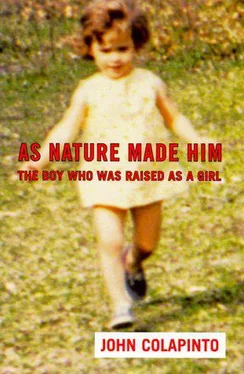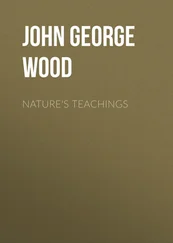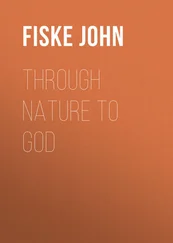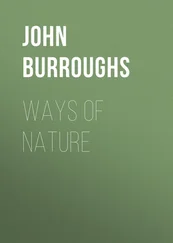“And now you feel complete as a woman?” Davis asked.
Her response was unequivocal: “Oh, yes, definitely. Yes. Completely—body and mind.”
The audience was then invited to ask questions. It was near the end of the segment that a young man asked the question that had been forming in Janet’s mind. He asked about “the other group of sex patients” whom Dr. Money treated—newborn babies with what Dr. Money had earlier called “unfinished genitals,” babies whose private parts were neither male nor female at birth. In replying to this question, Dr. Money explained that he and his colleagues at Johns Hopkins could, through surgery and hormone treatments, make such children into whichever sex seemed best, and that the child could be raised happily in that sex. “The psychological sex in these circumstances,” as Dr. Money put it, “does not always agree with the genetic sex nor with whether the sex glands are male or female.”
Despite the big words and the rapidity with which Dr. Money spoke them, Janet and Ron caught their meaning. Dr. Money was saying that the sex a baby was born with didn’t matter; you could convert a baby from one sex to the other.
Janet turned to Ron. “I think I should write to this Dr. Money,” she said.
Ron agreed. When the segment ended a few minutes later, Janet wrote a letter to Dr. Money describing what had happened to Bruce. Dr. Money’s reply was prompt. He expressed great optimism about what could be done for the Reimers’ baby at Johns Hopkins and urged them to bring the child to Baltimore without delay.
After so many months of grim predictions, bleak prognoses, and hopelessness, Dr. Money’s words, Janet says, felt like a balm. “Someone,” she says, “was finally listening .”
DR. MONEY WAS indeed listening. In a sense, Janet’s cry for help was one that he might have been waiting for his entire professional life.
At the time the Reimer family’s plight became known to him, John Money was already one of the most respected, if controversial, sex researchers in the world. Born in 1921 in New Zealand, he had come to America at the age of twenty-five, received his Ph.D. in psychology from Harvard, then joined Johns Hopkins, where his rise as a researcher and clinician specializing in sexuality was meteoric. Fifteen years after joining Johns Hopkins, he was already widely credited as the man who coined the term gender identity to describe a person’s inner sense of himself or herself as male or female. He was also known as the world’s undisputed authority on the psychological ramifications of ambiguous genitalia and was making headlines around the world for his establishment of the pioneering Johns Hopkins clinic for transexual surgeries.
As his unflappable appearance on This Hour Has Seven Days would suggest, Money was also a formidable promoter of his ideas. “He’s a terribly good speaker, very organized, and very persuasive in his recital of the facts regarding a case,” says Dr. John Hampson, a child psychiatrist who, with his wife, Joan, coauthored a number of Money’s groundbreaking papers on sexual development in the mid-1950s. “I think a lot of people were envious. He’s kind of a charismatic person, and some people dislike him.”
Money’s often overweening confidence actually came to him at some cost. His childhood and youth in rural New Zealand had been beset by anxieties, personal tragedies, and early failure. The son of an Australian father and an English mother who belonged to the Brethren church, he was a thin, delicate child raised in an atmosphere of strict religious observance—or what he would later derisively call “tightly sealed, evangelical religious dogma.” His sense of intellectual superiority developed early. On his first day of school at age five, he was set upon by bullies and took refuge with a female cousin in the girls’ play-shed, where boys would not be caught dead. “Having not measured up as a fighter,” Money would later write, “I was set on the pathway of outwitting other kids by being an intellectual achiever. That was easier for me than for most of them.”
Money’s childhood difficulties were compounded by his vexed relationship with his father. Six decades later he would write with barely controlled venom of this father, portraying him as a brutal man who heartlessly shot and killed the birds that infested his fruit garden, and administered to his four-year-old son an “abusive interrogation and whipping” over a broken window. This incident, Money wrote, helped establish his lifelong rejection of “the brutality of manhood.”
Money was eight years old when his father died of a chronic kidney ailment. “My father died without my being able to forget or forgive his unfair cruelty,” Money wrote. Not told of his father’s death until three days after seeing him carried off to the hospital, Money’s shock was compounded by the experience of being informed by an uncle that now he would have to be the man of the household. “That’s rather heavy duty for an eight-year-old,” Money wrote. “It had a great impact on me.” As an adult, Money would forever avoid the role of “man of the household.” After one brief marriage ended in divorce in the early 1950s, he never remarried, and has never had children.
After his father’s death, Money was raised in an exclusively feminine atmosphere by his mother and spinster aunts, whose anti-male diatribes also had a lasting effect on him. “I suffered from the guilt of being male,” he wrote. “I wore the mark of man’s vile sexuality”—that is, the penis and testicles. In light of Money’s future fame in both adult and infant sex change, his next comment has an unsettling tenor: “I wondered if the world might really be a better place for women if not only farm animals but human males also were gelded at birth.”
A solitary adolescent with a passion for astronomy and archaeology, Money also harbored youthful ambitions as a musician, a goal doomed to disappointment once Money realized that he would never be more than a skilled amateur. As an undergraduate at Victoria University, in the New Zealand capital city of Wellington, Money discovered a new passion into which he rechanneled his thwarted creativity: the science of psychology. Like so many students drawn to the study of the mind and emotions, Money’s interest in the discipline was in large part as a means for solving certain troubling questions about himself. His first serious work in psychology, his master’s thesis, concerned “creativity in musicians,” in which, Money writes, “I began to investigate my relative lack of success in comparison with that of other music students.”
His decision soon after that to narrow his studies to the psychology of sex had a similarly personal basis. Having departed sharply from his parents’ faith, Money grew increasingly to react against what he saw as the repressive religious strictures of his upbringing. The academic study of sexuality, which removed even the most outlandish sexual practices from moral considerations into the “pure” realm of scientific inquiry, was for Money an emancipation. From his twenties on, he would be a fierce proselytizer for sexual curiosity and exploration. By the mid-1970s, with the sexual revolution in full rampage, Money would step out publicly as a champion of open marriage, nudism, and other more rarefied manifestations of the culture’s sexual unbuttoning. “There is plenty of evidence that bisexual group sex can be as personally satisfying as a paired partnership, provided each partner is ‘tuned in’ on the same wavelength,” he wrote in his book Sexual Signatures . Elsewhere, he has described his own private life as casual and eclectic—“a give-and-take of sexual visitations and friendly companionships with compatible partners, some women, some men.”
Читать дальше












